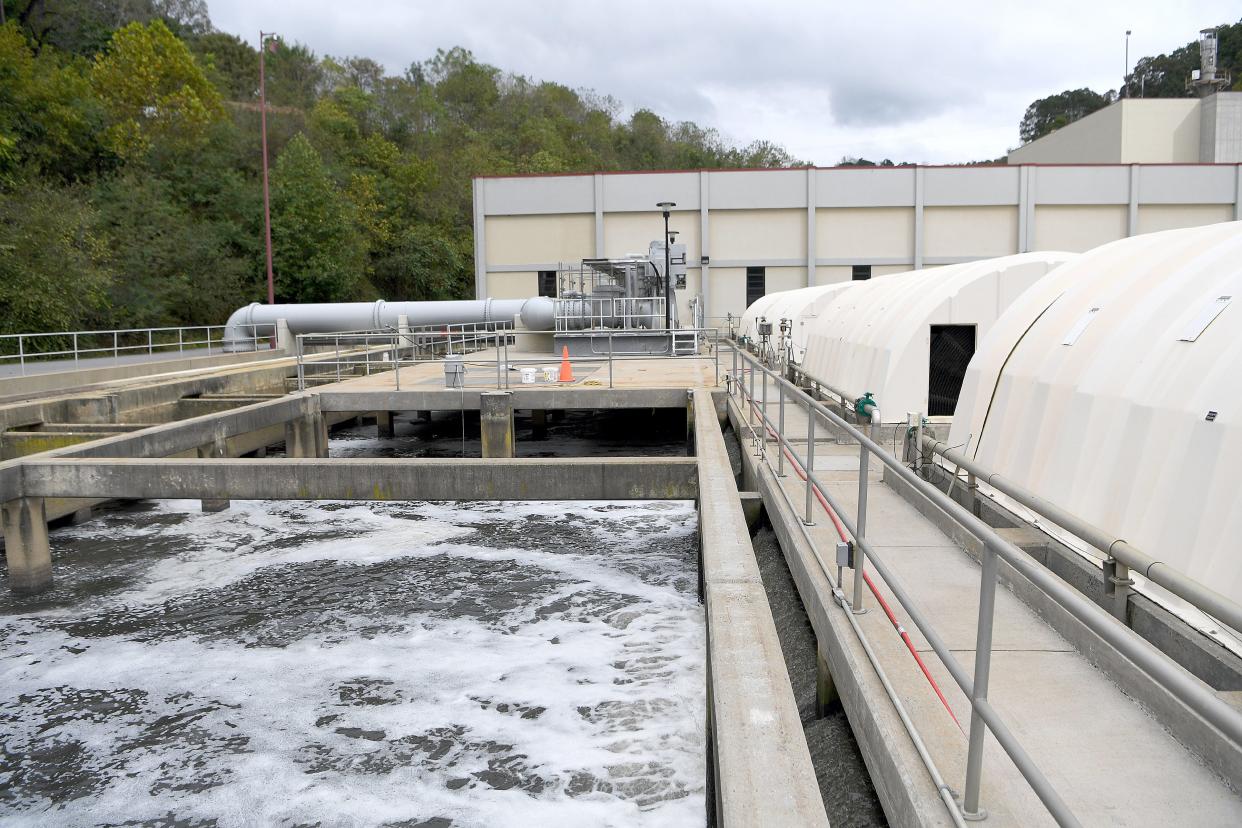Answer Man: COVID testing at the wastewater plant? Biltmore Estate security issue?

Today’s batch of burning questions, my smart-aleck answers and the real deal:
Question: While thankfully we’re having a respite from having to take precautions against the COVID-19 virus, the highly contagious BA.2 subvariant is stealthily making its way into the U.S. One good indicator is wastewater tracking. Experts say that pieces of the virus collected in wastewater can serve as advance warning several days before official case counts rise. Do the Asheville/Buncombe County officials monitor virus upticks in our wastewater?
My answer: If so, I bet at the end of the day these testers are really pooped.
Real answer: The Metropolitan Sewerage District of Buncombe County is the largest wastewater treatment plant in the area. Located in Woodfin, the plant handles wastewater from much of Buncombe County and parts of Henderson County.
More: Answer Man: Sewage 'stench' permeates Woodfin? Plant in compliance with regulations?
"MSD is involved in COVID testing of wastewater at our plant," General Manager Tom Hartye said via email. "This is being done in partnership with the Health Department, CDC, and the state of North Carolina."
About 20 sites statewide are doing the testing.
The most recent report Hartye sent me a link for was for data as of March 23. It read in part: “MSD of Buncombe County Report Summary: Most recent sample: Percent change (15 day window): + 165.1%. Second most recent sample: Percent change (15 day window): +198.5%.”
The testing finds the SARS-CoV-2 virus, which causes COVID-19.
While the increase above seems pretty high, Buncombe County Public Health Director Stacie Saunders said April 5 it is not cause for alarm.
More: Answer Man: Mysterious smelly 'portal' along greenway? Expired license follow-up?
"It does appear that we are seeing an increase in the wastewater monitoring, but this increase is in the context that these are very low levels and any rise and fall in the levels may cause larger swings in the percentages," Saunders said via email.
The state updates these tests every week, by the way, so there is more current data.
The state website explains the testing process:
"To better understand COVID-19 in North Carolina, North Carolina Department of Health and Human Service is testing samples of wastewater from select wastewater treatment plants across the state to look for SARS-CoV-2, the virus that causes COVID-19. People with COVID-19 shed viral particles in their stool. These viral particles are pieces of the SARS-CoV-2 virus, which causes COVID-19 when still intact. In wastewater, the particles are no longer infectious but can still be measured. Testing wastewater for these viral particles allows us to track COVID-19 trends among people contributing to the wastewater. Data from these sites serve as a supplemental metric to understand the impacts of COVID-19 at the community level.
"Participating wastewater utilities collect a wastewater sample (24-hour mixture, or composite) twice per week. Wastewater samples are analyzed in the laboratory to determine the amount of SARS-CoV-2 virus that is present. The amount of SARS-CoV-2 virus, measured as viral gene copies, can indicate if COVID-19 is increasing or decreasing in a community."
As we noted in a story April 6, Buncombe's COVID-19 case count is plateauing at an almost historical low, county health officials are decreasing public updates and vaccines are becoming more available to those who need them most.

Question: We just got back from an early meander around the Biltmore gardens, something we like to do fairly frequently, being passholders. Since our last visit, security has changed. Again. Visitors are now funneled through buildings with scanners of some kind, just to get from the parking lot onto the property. Many of the pathways which wandered the gardens are closed off, and to get back from the gardens to your car you have to be screened again. This means that although we have no interest in visiting the house, we have to walk through two of these buildings for scanning. May one ask why? Clearly, “security” will be their answer, but for those of us who just come to look at the grounds, it interferes with the experience, and frankly during COVID seems like a poor idea. Screened twice to not go into the house, and once to go in? Someone thinks that makes sense? Why?
My answer: Clearly, these two-for-one deals on scanning were not the greatest marketing plan ever.
Real answer: Well, Biltmore answered this question with more words than just "security," but it doesn't offer much in the way of an explanation. But there's a reason for that...
"While we do not broadly discuss the specifics of our security procedures to avoid compromising their effectiveness, we do continuously work to refine our security screening process," estate spokeswoman Marissa Jamison said via email. "We value this feedback that has been shared and the commitment we receive from our Passholders. It helps to improve our process as we strive to balance offering an exceptional experience on the estate with implementing industry standard screening procedures."
More: Answer Man: Helicopter rides over Biltmore Estate? What are the rules?
While most of us probably don't think a lot about security or possible terrorism at places like the Biltmore Estate, these venues and facilities have to. Terrorists consider many of these places "soft targets," and the U.S. Department of Homeland Security addressed this in a 2018 report titled, "Soft Targets and Crowded Places Security Plan Overview."
More: Boyle column: Biltmore exhibit on early workers a spiritual journey for family
It reads in part:
"Soft Targets and Crowded Places (ST-CPs) are locations that are easily accessible to large numbers of people and that have limited security or protective measures in place making them vulnerable to attack. ST-CPs can include, but are not limited to, schools, sports venues, transportation systems or hubs, shopping venues, bars and restaurants, hotels, places of worship, tourist attractions, theaters, and civic spaces. ST-CPs do not have to be buildings and can include open spaces such as parks and pedestrian malls."
And this:
"Preventing attacks against ST-CPs and reducing impacts of attacks that do occur is a shared mission among many stakeholders, including the general public; ST-CP owners and operators; private industry; State, local, tribal, and territorial (SLTT) partners; and the Federal government."
So trust me, I'm sure a team of folks at Biltmore think about this stuff a lot. Yes, the inconvenience is annoying, but they're doing it for a reason.
This is the opinion of John Boyle. To submit a question, contact him at 232-5847 or jboyle@citizen-times.com
This article originally appeared on Asheville Citizen Times: Answer Man: COVID testing at wastewater plant? Biltmore security?
